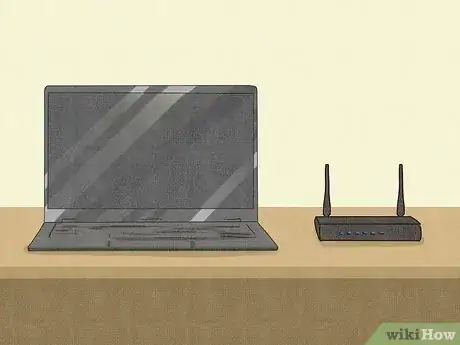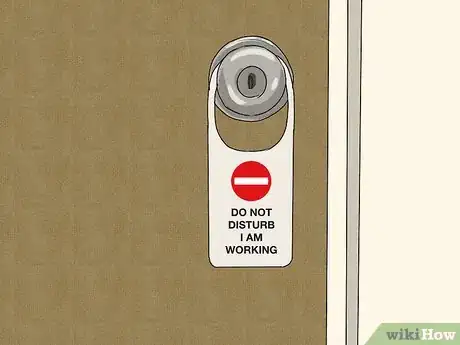This article was co-authored by Jessica Elliott, ACC, CEC and by wikiHow staff writer, Hannah Madden. Jessica Elliott is a Certified Executive Coach and multi-passionate entrepreneur. She's the founder of LIFETOX, where she hosts mindful experiences and retreats, and J Elliott Coaching, which she provides executive consulting for professionals, teams, and organizations. Jessica has had over fifteen years experience as an entrepreneur and over five years of executive coaching experience. She received her ACC (Associate Certified Coach) accreditation through the International Coaching Federation (ICF) and her CEC (Certified Executive Coach) accreditation through Royal Roads University.
There are 17 references cited in this article, which can be found at the bottom of the page.
This article has been viewed 66,610 times.
Work problems can cause a lot of stress in your life. Since so much of your time is spent in the workplace, it’s important to resolve them to preserve your mental and emotional health. Whether you do your work remotely, in an office setting, or anywhere in between, you can approach work problems professionally to start solving them right away.
Steps
Coworker Conflicts
-
1Be polite and direct when addressing an issue. Don’t beat around the bush when you have a problem with your coworker. It is usually easier to address the problem as soon as it comes up, rather than stew over it or get someone else involved.[1]
- Be informal about it the first time you address the person. You could say, “Hey, Jack, I’ve been noticing that you’ve been returning the truck almost on empty lately. Could you remember to bring it back with a full tank next time?”
- If the behavior continues after you have informally addressed your concern, you may need to ask your supervisor to intervene. Follow your company’s rules on handling employee conflict resolution.
-
2Use “I” language to avoid blaming your coworkers. It’s important to express yourself in a respectful manner. When discussing issues with a coworker, don’t make them feel defensive when you speak to them. You can do this by using “I” statements. The other person hears your reactions to the situation, not your accusations.[2]
- Instead of saying, “We are always waiting on you to get your portion of the work done,” you could say, “When the work isn’t in on time, I get worried that we’re going to miss our deadline. It would be helpful if everyone could meet their deadlines on the agreed-upon day.”
Advertisement -
3Find a support network at work. You spend a lot of time with the same group of people at work; why not get to know some of them better? Try to make some good connections with others, and develop a network of friends who can help you through your work (and life) frustrations.[3]
- Spend your lunch break with your coworkers and get to know them better away from work.
- Spend a few minutes chatting with your coworkers each day.
- Invite them to get together after work for dinner or drinks.
-
4Keep records of any ongoing problems you may have with a coworker. If you are dealing with a coworker bullying or harassing you, be sure you are keeping track of all incidents with that person. Record the date, time, what happened, and if there were any witnesses.[4]
- Be sure to find out what your employer’s protocol is in dealing with coworker conflict, bullying, and/or harassment. Your employee handbook or human resources representative would be a good source of information.
- Research laws protecting your rights when you are being bullied or harassed by a coworker.
-
5Escalate the situation by going to your boss if you need to. You may or may not get along well with your supervisor, but keep the lines of communication open between the two of you as best you can. Remember that it is part of your boss’ responsibility to ensure that you are in an environment that enables you to get your work done, so don’t feel like you need to keep concerns from them.[5]
- If you are having a difficult time communicating and getting along with your boss, you may wish to bring your concerns to your HR department. You could say, “Ms. Jones, I’m coming to you because I’ve been having some problems working with Mr. Roberts lately. I’m hoping you can help me figure out what to do.”
Job Duties and Advancement
-
1Talk to your boss if you’re doing extra work that you didn't sign on for. Sometimes the job you have is different from the job you applied for. If you are finding yourself taking on additional responsibility, or are doing tasks you do not feel qualified for, bring your concerns to your supervisor. Find a copy of the job description you were hired for and bring it to your boss to talk about it.[6]
- You could say, “Here is a copy of my job description, and here is all the work I am currently doing. I think we need to talk about the expectations for my position.”
- You could use your additional responsibilities as leverage for a pay raise. You could say, “I think if you expect me to continue to do these additional responsibilities, it may be wise to talk about an increased salary.”[7]
-
2Look for additional training opportunities to advance your position. If you feel your job performance would improve with additional training or classes, be proactive in seeking out training you feel would be beneficial. Look for training within your company or in your community (perhaps in a community college or a university extension class), and bring the opportunity to your supervisor’s attention.[8]
- You could say, “I found this coding workshop that’s going on at the local college next month. I think this is exactly the kind of course I need to help take my performance to the next level and help me gain a greater understanding of my position. Would the company be able to sponsor me to attend this workshop? Here is the information on it.”
- You could consider seeking out a mentor within your company to help you better understand your role.
-
3Be open to feedback from your boss. Sometimes work problems can develop when you get little or no feedback on your performance. Take the initiative and ask your boss if they’d be willing to have a conversation with you on how you are doing in your position. Set a meeting for you and your boss to talk, and give them a sense of what you’d like to talk about.[9]
- For example, you could say, “I was curious to know how you felt about my performance over the last few months. I think I’ve been taking on more responsibilities, and I wanted to get some feedback on what I’ve done well and what needs improvement.”
- Don’t beat yourself up over a bad performance review. Look at it as a learning opportunity, asking lots of questions so you can best understand how you can make changes. You could say, “I appreciate you bringing these concerns to my attention. Do you have any suggestions as to what I can do to improve my next review?”
-
4Look into filing a complaint if you're being taken advantage of. If you feel you are being treated unfairly and your problem has not been solved or addressed, you can take steps to have the problem identified through a more formal procedure. If complaint procedures are not spelled out in your employee handbook, find out through management or HR what steps you need to take.[10]
- You could say, “John, I’ve taken all of the steps in the employee handbook to follow the chain of command at work, but my concerns are still not being addressed. I want to find out how to file a formal complaint within the company.”
- If you feel you are being harassed or discriminated against, for example, it may be beneficial to you to file a complaint with the Equal Employment Opportunity Commission (if you live in the United States). Find out more at https://www.eeoc.gov/index.cfm.
Stress Management
-
1Talk to your manager if you're feeling overwhelmed. Tell your supervisor if you think that you’ve been given too much work. Let them know that you’re feeling overwhelmed, and ask how you can prioritize better.[11]
- You could say, “Mike, I appreciate being a valued team member, but I am drowning in all this work right now. I’m working late and not seeing my kids. What can we do to make this workload easier to manage?”
-
2Talk to a supervisor in private if you’re dealing with a personal problem. If you find stress from your personal life creeping into your work life, be upfront with your supervisor without going into too many details. A good supervisor will likely appreciate knowing what is going on.[12]
- Wait for an opportunity to talk to your supervisor alone and let them know what’s up. You could say, “I just wanted to let you know that I’ve got some issues I'm dealing with at home. I'm handling it, but there may be a few days when I need to come in late next week.”
- Keep in mind that you're not obligated to disclose health information, but you may need to be a bit more forthcoming if you are dealing with an ongoing health problem. For example, you might say, “I’ve been told by my doctor that I am going to need surgery. I'll need to take a few days off next month to recover. I’ll let you know the exact days as soon as everything is scheduled.”
-
3Eat well both at home and on the job so you have plenty of energy. Avoid going out for fast food over lunch, and pack a healthy lunch instead. You’ll save money as well as improve your health. Putting healthy food in your body will help better regulate your moods and manage stress.[13]
- Pack a salad in a jar filled with vegetables and protein to get a big serving of veggies and help you avoid the late-afternoon sugar cravings.
- Make healthy snack choices if you need a bite to eat. Consider almonds, cheese sticks, or vegetables with hummus.
- Avoid foods that send your blood sugar soaring and then crashing, like sugary treats and refined carbohydrates. You will feel even worse.
- Coffee and caffeinated beverages are a mainstay of the office, but too much can leave you feeling anxious and stressed. Limit your intake.
- Drink plenty of water during your workday so you don't get dehydrated.
-
4Exercise, stretch, or get up and move around on your breaks. Not only is this good for your physical health, but it is also good for your mental health as well. You could try stretching, taking a quick walk, or doing a quick workout routine on your lunch break.[14]
- If you work a sedentary/desk job, get up from your desk at regular intervals to walk around for a few minutes. It will help you refocus and feel more energized and productive.
-
5Get around 8 hours of sleep per night so you're ready to face each day. Make sure you are getting to bed at a reasonable hour. Sleep deprivation makes emotional regulation more difficult, causing increased irritability and stress.[15]
- Do something relaxing before bed. Avoid catching up on work email or anything stressful. Try reading for pleasure, taking a bath, or drinking chamomile tea.
- Avoid screens an hour before bedtime. The glow from the screen can stimulate wakefulness, making it harder to fall asleep.
Remote Working
-
1Set up your computer and Wi-Fi to meet your needs. If you have to talk via video chat often, make sure you have a quality webcam and good lighting. Double check your Wi-Fi speed to make sure it’s running well, and set up your computer monitor at eye level so you don’t have to hunch or strain to see your screen.[16]
- Try putting your router and modem as close to your computer as possible for the fastest Wi-Fi speeds.
- If you think your internet is slow, try running a speed test on a website like M-Lab or Ookla. They’ll be able to tell you how fast your internet is running and what you might need to fix if it’s slow.
-
2Create a dedicated workspace in a quiet spot so you can focus. Set up an area of your home with your computer and anything else you need to do your job. Make sure it’s an out-of-the-way location without a ton of distractions so you can work efficiently throughout the day.[17]
- Keep your work area away from the TV so you aren’t tempted to watch anything while you work.
- Ideally, you would set up your workspace in a home office or spare bedroom so you can shut the door while you’re working.
-
3Talk with your coworkers over video chat to stay connected. Sending instant messages and emails are fine, but it can feel a little bit lonely. Try to check in with your coworkers and chat about other things, like what you did that weekend or what you’re doing later, before moving on to work stuff.[18]
- You could all meet up 10 minutes before a scheduled meeting to chat about random stuff that doesn’t have to do with work.
- Ask questions like, “So what did you all do this weekend?” or, “How are your kids doing?”
-
4Ask for help if you’re stuck or having problems completing tasks. When you work from home, it can sometimes feel like you’re doing your job all by yourself. Don’t be afraid to message or email your coworkers or boss for clarifications if you need to.[19]
- It might be helpful to have a weekly or monthly check-in with your team or boss to make sure you’re on the right track.
- You can also ask questions during team meetings over video chat.
-
5Establish boundaries with the people you live with. Working remotely is still a job, even if you’re home all day. Be sure to let your family members or roommates know that you’ll need a moderate level of peace and quiet throughout the day while you’re working.[20]
- You could say something like, “I know I’m home, but from 8 to 4 everyday I’m actually working. If you need something, please knock first in case I’m in a meeting.”
- If working from home is too challenging or distracting, try going to a coffee shop or a library that has free Wi-Fi.
-
6Avoid working after hours to prevent burnout. If you have set hours, make sure you shut down your computer and step away from your desk once you’re done. Working long, irregular hours can lead to burnout, and it might make you resentful of your job.[21]
- It’s much easier to extend your workday when you’re just sitting at home. If you’re having trouble shutting down for the day, try setting an alarm on your phone.
Expert Q&A
Did you know you can get expert answers for this article?
Unlock expert answers by supporting wikiHow
-
QuestionHow do you deal with two-faced coworkers?
 Jessica Elliott, ACC, CECJessica Elliott is a Certified Executive Coach and multi-passionate entrepreneur. She's the founder of LIFETOX, where she hosts mindful experiences and retreats, and J Elliott Coaching, which she provides executive consulting for professionals, teams, and organizations. Jessica has had over fifteen years experience as an entrepreneur and over five years of executive coaching experience. She received her ACC (Associate Certified Coach) accreditation through the International Coaching Federation (ICF) and her CEC (Certified Executive Coach) accreditation through Royal Roads University.
Jessica Elliott, ACC, CECJessica Elliott is a Certified Executive Coach and multi-passionate entrepreneur. She's the founder of LIFETOX, where she hosts mindful experiences and retreats, and J Elliott Coaching, which she provides executive consulting for professionals, teams, and organizations. Jessica has had over fifteen years experience as an entrepreneur and over five years of executive coaching experience. She received her ACC (Associate Certified Coach) accreditation through the International Coaching Federation (ICF) and her CEC (Certified Executive Coach) accreditation through Royal Roads University.
Certified Executive Coach
-
QuestionWhat are the common problems at work?
 Trudi Griffin, LPC, MSTrudi Griffin is a Licensed Professional Counselor in Wisconsin specializing in Addictions and Mental Health. She provides therapy to people who struggle with addictions, mental health, and trauma in community health settings and private practice. She received her MS in Clinical Mental Health Counseling from Marquette University in 2011.
Trudi Griffin, LPC, MSTrudi Griffin is a Licensed Professional Counselor in Wisconsin specializing in Addictions and Mental Health. She provides therapy to people who struggle with addictions, mental health, and trauma in community health settings and private practice. She received her MS in Clinical Mental Health Counseling from Marquette University in 2011.
Professional Counselor
-
QuestionHow do you deal with a difficult person at work?
 Trudi Griffin, LPC, MSTrudi Griffin is a Licensed Professional Counselor in Wisconsin specializing in Addictions and Mental Health. She provides therapy to people who struggle with addictions, mental health, and trauma in community health settings and private practice. She received her MS in Clinical Mental Health Counseling from Marquette University in 2011.
Trudi Griffin, LPC, MSTrudi Griffin is a Licensed Professional Counselor in Wisconsin specializing in Addictions and Mental Health. She provides therapy to people who struggle with addictions, mental health, and trauma in community health settings and private practice. She received her MS in Clinical Mental Health Counseling from Marquette University in 2011.
Professional Counselor
References
- ↑ http://www.acas.org.uk/index.aspx?articleid=1364
- ↑ https://www.lifespan.org/lifespan-living/workplace-wellness-avoiding-conflicts-coworkers
- ↑ https://www.helpguide.org/articles/stress/stress-at-work.htm
- ↑ https://www.dol.gov/agencies/oasam/centers-offices/civil-rights-center/internal/policies/workplace-harassment/2012
- ↑ http://www.forbes.com/sites/mikemyatt/2012/02/22/5-keys-to-dealing-with-workplace-conflict/#12412bce15a0
- ↑ https://www.dailyworth.com/posts/2565-how-to-deal-with-common-workplace-issues/4
- ↑ http://archive.boston.com/bostonglobe/magazine/articles/2010/03/07/overworked_heres_how_to_deal/?page=full
- ↑ https://online.hbs.edu/blog/post/how-to-get-ahead-at-work
- ↑ https://www.dailyworth.com/posts/2565-how-to-deal-with-common-workplace-issues
- ↑ https://www.acas.org.uk/grievance-procedure-step-by-step
- ↑ https://www.dailyworth.com/posts/2565-how-to-deal-with-common-workplace-issues/2
- ↑ http://www.inc.com/minda-zetlin/employee-facing-personal-problems-heres-what-to-do.html
- ↑ https://www.helpguide.org/articles/stress/stress-at-work.htm
- ↑ https://www.helpguide.org/articles/stress/stress-at-work.htm
- ↑ http://www.apa.org/news/press/releases/stress/2013/sleep.aspx
- ↑ https://www.nytimes.com/2020/03/18/technology/personaltech/working-from-home-problems-solutions.html
- ↑ https://www.psychologytoday.com/us/blog/biofeedback-and-mindfulness-in-everyday-life/202003/77-strategies-working-home-during-covid-19
- ↑ https://www.psychologytoday.com/us/blog/biofeedback-and-mindfulness-in-everyday-life/202003/77-strategies-working-home-during-covid-19
- ↑ https://knowledge.insead.edu/leadership-organisations/the-three-main-challenges-of-remote-working-13651
- ↑ https://knowledge.insead.edu/leadership-organisations/the-three-main-challenges-of-remote-working-13651
- ↑ https://blog.dce.harvard.edu/professional-development/challenges-managing-virtual-teams-and-how-overcome-them















































































